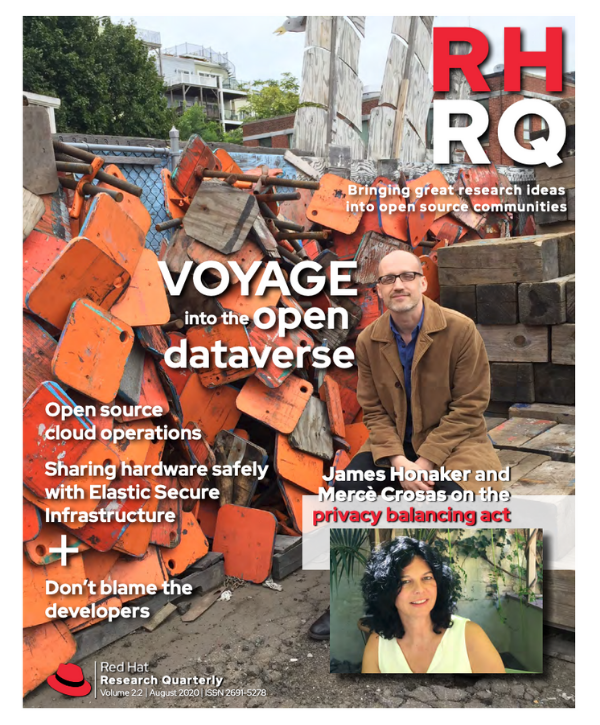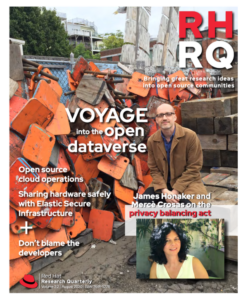Faculty, PhD students, and Red Hat associates in the northeast United States are collaborating actively on research projects in many areas, despite the impact of COVID-19. The pursuit, testing, and examination of important research questions continues from spare bedrooms, kitchen tables, and even masked, socially distanced walks outside, with the support of many open source collaboration tools. Here we share recent highlights from some of our most active projects.
Researchers have been dispersed but not discouraged, as a recent story about Azer Bestavros (http://www.bu.edu/articles/2020/my-battle-with-covid-19-azer-bestavros/) and his battle with COVID-19 illustrates. A longtime Red Hat collaborator and Associate Provost for Computing and Data Sciences at Boston University, Bestavros eventually recovered and is looking ahead to future discoveries. We are starting to get involved in technology responses to COVID-19, such as the Private Automated Contact Tracing project (https://research.redhat.com/blog/research_project/pact-private-automated-contact-tracing/), which involves researchers from many universities working to preserve privacy while making exposure contact tracing faster and easier to do.
We are starting to get involved in technology responses to COVID-19, such as the Private Automated Contact Tracing project…
Students and faculty from many Red Hat collaborative research projects presented results and participated in panels at the 2020 Open Cloud Workshop (https://massopen.cloud/events/2020-open-cloud-workshop). We are starting more research projects related to the newly announced initiatives for the Open Cloud Testbed (https://massopen.cloud/connected-initiatives/open-cloud-testbed), New England Research Cloud, OpenInfra Labs (https://massopen.cloud/connected-initiatives/openinfra-labs-oilabs), and Operate First (https://massopen.cloud/connected-initiatives/operate-first). Check the workshop pages for full presentations and accompanying materials.
The Open Cloud FPGA Testbed initiative, led by Martin Herbordt, Boston University, and Miriam Leeser, Northeastern University, has been very active in projects on FPGAs in Large-Scale Computer Systems (https://research.redhat.com/blog/research_project/fpgas-in-large-scale-computer-systems/). A submitted paper on the first working multiparty computation FPGA example in a cloud instance depicts the use of FPGAs with secret sharing in the datacenter and examines the performance improvement compared to a pure software implementation. Ahmed Sanaullah and Uli Drepper presented results on “Programming FPGAs the Open Source Way” (https://www.youtube.com/watch?v=P5gaw35L58I)at DevConf.CZ. Two PhD students from the University of Massachusetts are joining this group of BU and Red Hat collaborators during the summer to investigate open place and route tooling and DNN optimizations for FPGAs.
The Unikernal Linux (https://research.redhat.com/blog/research_project/unikernel-linux/) project continues to build on results presented last year at HotOS XVII, with several parallel projects. The April 2020 Eurosys paper “SEUSS: Skip Redundant Paths to Make Serverless Fast” (https://dl.acm.org/doi/abs/10.1145/3342195.3392698) showed how rapid deployment and high-density caching of serverless functions based on unikernel snapshots improved Function-as-a-Service platform throughput by 51 times on a workload composed entirely of new functions.
Researchers from the Elastic Secure Infrastructure project (https://research.redhat.com/blog/research_project/elastic-secure-infrastructure-2/) presented a paper entitled “Towards Non-Intrusive Software Introspection and Beyond” (https://research.redhat.com/wp-content/uploads/2020/04/Mohan_NISI.pdf) at the IEEE International Conference on Cloud Engineering in April. A related project to support multi-tenancy for bare metal machines for the open source Ironic project also completed and merged code that is included in the Usurri release. (See Tzu-Mainn Chen and Lars Kellogg-Stedman’s article in this issue.) Multi-tenant Ironic slides (https://research.redhat.com/esi_ironic-presentation/) from an ESI Birds of a Feather discussion at the 2020 Open Cloud Workshop provide more information on the changes.
New PhD students from BU, UMass Lowell, and Worcester Polytechnic Institute are collaborating with Red Hat Research this summer. They will be contributing to open FPGA, open hybrid cloud, and AI projects. Expect to see updates on their new projects and progress on existing projects over the summer on research.redhat.com.
Check the complete project pages on research.redhat.com or contact academic@redhat.com for more
information.


